When to Consult a Vet Before Starting Pet Yoga
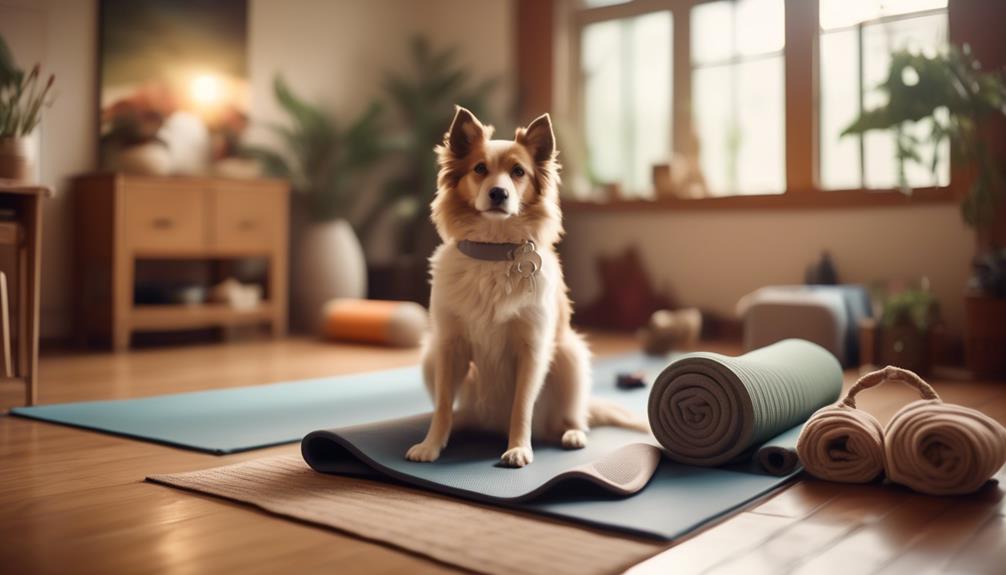
Consulting a vet before starting pet yoga is essential. This is important to ensure a safe and enjoyable experience. The vet can take into account any pre-existing medical conditions that your pet may have. They can also provide breed-specific considerations.
Taking the time to consult with a vet will help to prevent any potential health risks or discomfort for your pet during the yoga sessions. It will also allow you to get expert advice on how to modify certain poses or movements to accommodate your pet's unique needs. So, before embarking on your pet yoga journey, make sure to schedule a visit with your trusted vet.
Key Takeaways
- Consulting a vet is crucial before starting pet yoga, especially for pets with pre-existing medical conditions.
- Senior pets have specific needs and concerns when engaging in pet yoga, such as arthritis management and joint health.
- Puppies and kittens require special attention and considerations for their safety during pet yoga, as certain poses may be unsuitable for their delicate bones and developing muscles.
- Consultation with a vet is important before starting pet yoga for pets with behavioral issues or anxiety, as it can provide a calming and structured environment and help manage their symptoms.
Pre-Existing Medical Conditions

Before beginning a pet yoga practice, it's crucial for pet owners to consult with a veterinarian, especially if their furry companions have pre-existing medical conditions. Taking into consideration the health and well-being of the animals is of utmost importance. Pre-existing medical conditions can range from chronic illnesses to musculoskeletal issues or even respiratory problems. Consulting with a veterinarian will help determine whether pet yoga is suitable for the specific condition and what modifications may be needed.
For pets with pre-existing medical conditions, it's important to understand the potential risks and benefits of pet yoga. Some conditions may be aggravated by certain yoga poses or movements, while others may benefit from the gentle stretching and relaxation that pet yoga offers. The veterinarian will be able to assess the overall health of the pet and provide guidance on whether pet yoga is safe and appropriate.
Age-related concerns are also important to consider when starting a pet yoga practice. Older pets may have more fragile bones and joints, making certain poses more challenging or even risky. It's essential to consult with a veterinarian to evaluate the pet's age-related concerns and make any necessary modifications to ensure a safe and effective practice.
Recent Injuries or Surgeries
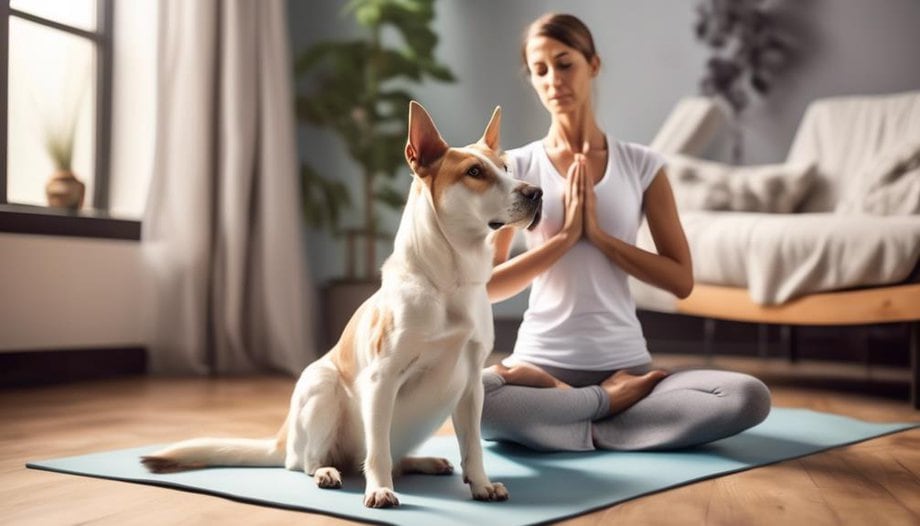
Pet owners should also take into consideration any recent injuries or surgeries their furry companions may have had before starting a pet yoga practice. It's crucial to understand that the healing process after an injury or surgery can vary among animals. Some pets may require more time to recover and regain their physical abilities compared to others. Therefore, consulting a vet is essential to assess their current condition and ensure that pet yoga is suitable for them.
When a pet has recently undergone surgery or experienced an injury, their body is still in the process of healing. Engaging in physical activities like pet yoga may put unnecessary strain on their muscles, joints, or wounds, hindering the healing process. Additionally, pets with recent injuries may have physical limitations that restrict their movements and prevent them from fully participating in yoga poses.
A veterinarian can provide valuable insights into the specific limitations and precautions needed for pets with recent injuries or surgeries. They can evaluate the extent of the injury, assess any ongoing healing processes, and recommend appropriate modifications or alternative exercises that promote healing while avoiding further harm. By seeking professional advice, pet owners can ensure the safety and well-being of their furry companions during their yoga journey.
Age-Related Concerns
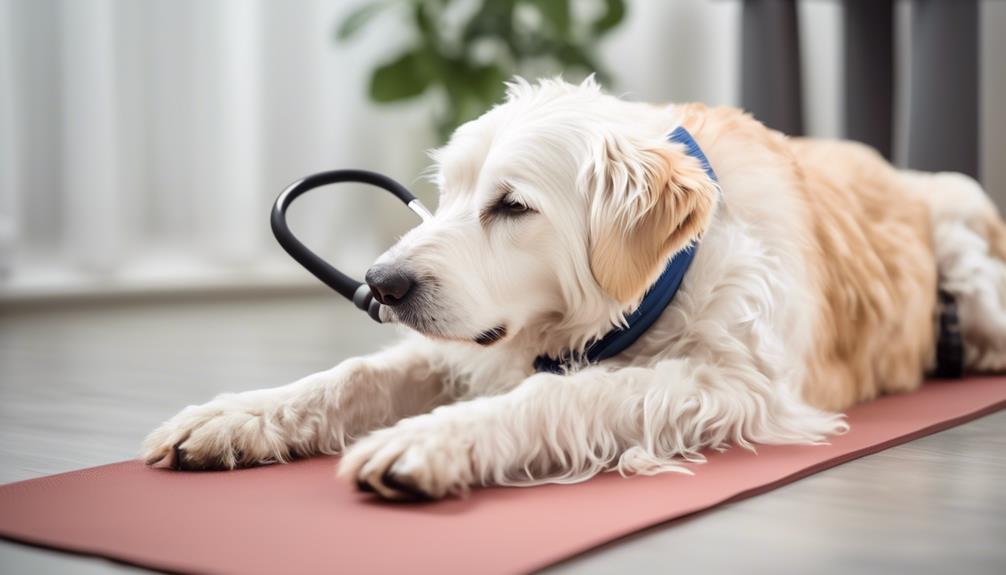
When considering pet yoga, it's important to take age-related concerns into account.
Senior pets may have limitations and may require modifications to their yoga practice.
On the other hand, puppies and kittens have developing bodies and may be more prone to injury.
It's crucial to consult a vet to ensure that pet yoga is safe and suitable for pets of all ages.
Senior Pet Considerations
As pets age, it is important to consider their unique needs and potential age-related concerns when engaging in pet yoga. Senior pets may have specific considerations when it comes to participating in this activity. One of the primary concerns for senior pets is arthritis management and maintaining joint health. Arthritis is a common condition that affects older animals, causing pain and stiffness in their joints. Engaging in pet yoga can help alleviate some of these symptoms and improve flexibility. However, it is crucial to consult with a veterinarian before starting any yoga routine with a senior pet. The table below highlights some age-related concerns and considerations for senior pets in pet yoga:
| Age-Related Concerns | Considerations for Senior Pets |
|---|---|
| Arthritis Management | Modify poses to reduce strain on joints |
| Joint Health | Incorporate gentle stretching exercises |
| Flexibility | Gradually increase intensity and duration of yoga sessions |
| Balance | Use props to assist with balance |
| Breathing Capacity | Encourage slow and controlled breathing techniques |
Puppy and Kitten Safety
Puppies and kittens require special attention and considerations when it comes to their safety during pet yoga sessions. Puppy socialization and kitten development are crucial aspects to keep in mind.
It's important to remember that puppies have delicate bones and joints that are still developing. Certain yoga poses, such as those that involve excessive stretching or putting pressure on their joints, may not be suitable for them.
Similarly, kittens have developing muscles and coordination, which makes them more prone to injuries during yoga sessions. It's essential to provide a safe and controlled environment for them to explore and learn.
Pet owners should consult with a veterinarian before starting pet yoga with puppies or kittens to ensure that the sessions are tailored to their specific needs, promoting their overall health and well-being.
Behavioral Issues or Anxiety
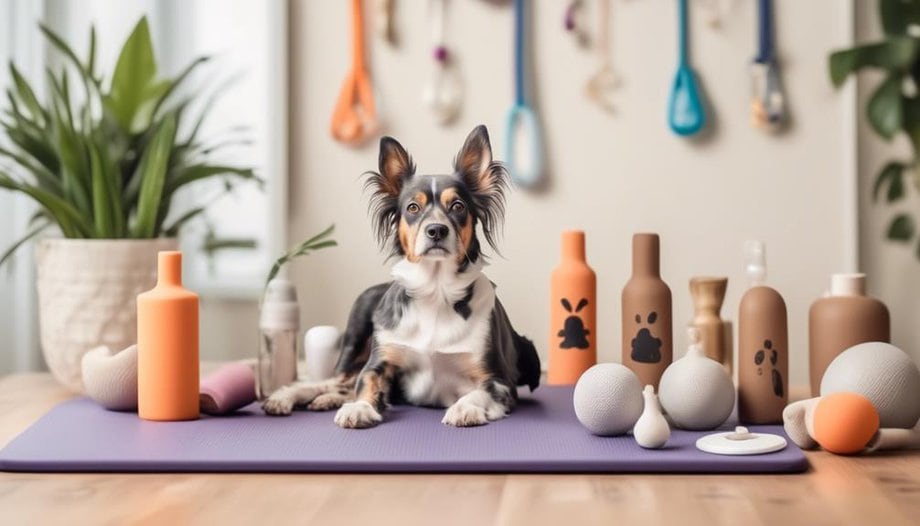
Do pets with behavioral issues or anxiety benefit from practicing pet yoga?
Many pet owners wonder if pet yoga can help their furry friends with aggression or separation anxiety. While pet yoga can be beneficial for some pets, it's important to consult a vet before starting any new activity or therapy.
Here are some key points to consider:
- Pet aggression:
- Pet yoga can help pets with aggression by providing a calming and structured environment.
- It can teach them to focus their energy and develop self-control, reducing the likelihood of aggressive behavior.
- Separation anxiety:
- Pet yoga can be a helpful tool in managing separation anxiety.
- The gentle movements and relaxation techniques can help pets feel more at ease and reduce stress levels when alone.
However, it's crucial to remember that every pet is unique, and what works for one may not work for another. Consulting a vet is important to assess the severity of the behavioral issues or anxiety and determine the best course of action. They can provide guidance on whether pet yoga is suitable and offer alternative solutions if necessary.
Medication or Treatment Plans
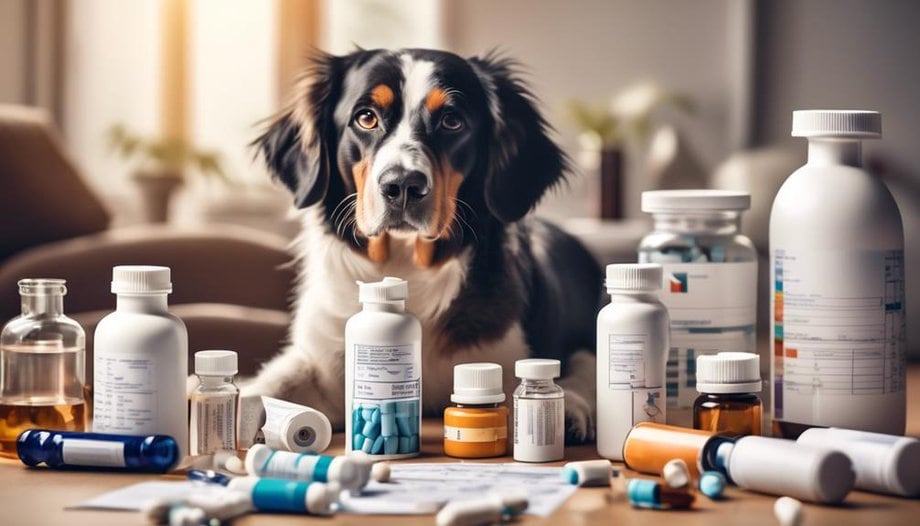
When addressing behavioral issues or anxiety in pets, consulting a vet is crucial not only for assessing severity but also for determining the most appropriate medication or treatment plans. Medication management plays a significant role in addressing these issues, and a veterinarian is the best person to guide pet owners through this process.
Vets have extensive knowledge regarding different medications available for pets and can evaluate the specific needs of each individual pet. They can prescribe medications that help manage anxiety, aggression, or other behavioral issues effectively. Additionally, vets can provide guidance on the proper dosage and administration of these medications, ensuring the pet's safety and well-being.
However, some pet owners may prefer holistic alternatives to medication management. In such cases, vets can also suggest alternative treatment plans that involve natural remedies, behavioral therapy, or lifestyle changes. These holistic approaches can be effective in managing certain behavioral issues, depending on the severity and underlying causes.
It is important to consult a vet before starting any medication or treatment plan for a pet. They have the expertise to evaluate the pet's condition, recommend the most suitable options, and monitor their progress. By involving a vet in the decision-making process, pet owners can ensure that their furry friends receive the best care and support for their behavioral issues or anxiety.
Breed-Specific Considerations

Considering breed-specific factors is essential when addressing the behavioral needs and challenges of a pet. Different dog breeds have varying exercise limitations and adaptability concerns, which should be taken into account before starting pet yoga. Here are some important breed-specific considerations to keep in mind:
- Exercise Limitations:
- Brachycephalic Breeds: Dogs with short noses, such as Bulldogs and Pugs, may have difficulty with strenuous physical activities due to their compromised respiratory systems. It's important to consult a vet to determine if pet yoga is suitable for them.
- Toy Breeds: Small dogs like Chihuahuas or Yorkies have delicate bone structures and may need modifications or shorter sessions to prevent injury during yoga poses.
- Adaptability Concerns:
- High-Energy Breeds: Certain dog breeds, like Border Collies or Jack Russell Terriers, have a lot of energy and need regular physical and mental stimulation. While pet yoga can be beneficial for them, it may be necessary to incorporate additional exercise and enrichment activities to meet their needs.
- Anxious or Fearful Breeds: Some breeds, such as Shy or Skittish breeds, may not be well-suited for a group yoga class. It's crucial to consider their comfort levels and consult with a vet to explore alternative options that promote relaxation and confidence.
Pregnancy or Postpartum Recovery
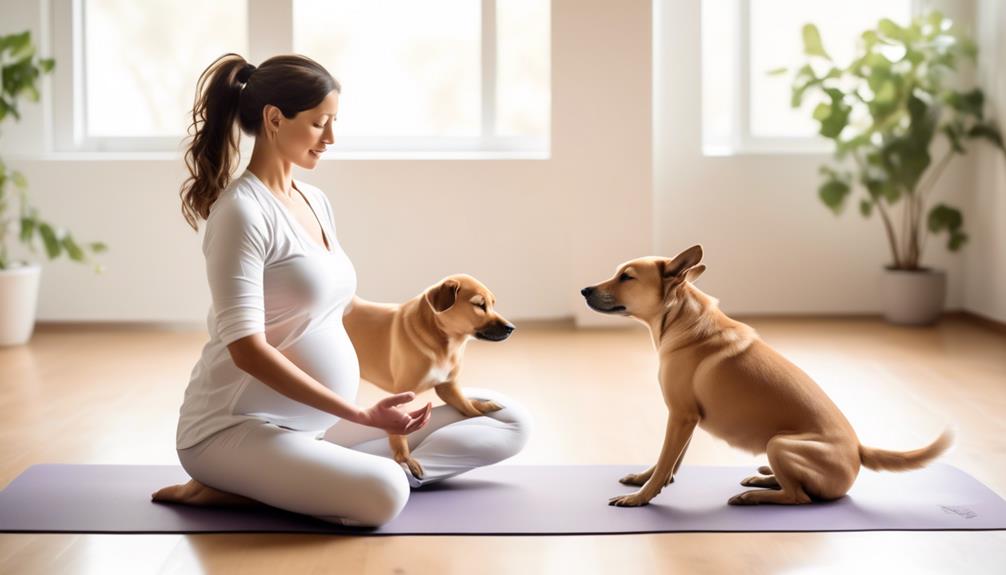
When it comes to pet yoga during pregnancy or postpartum recovery, it's crucial to consult a vet for approval and guidance.
Just like humans, pregnant animals have specific needs and limitations that should be taken into consideration before engaging in any physical activity.
A vet can provide valuable insight and advice on how to modify yoga poses to ensure the safety and well-being of both the pet and her offspring.
Vet Approval for Pregnancy
It is important to consult with a veterinarian for approval before engaging in pet yoga during pregnancy or postpartum recovery. The well-being of both the pet and the pregnant person is of utmost importance, and the vet can provide valuable guidance and ensure a safe experience.
When seeking vet approval for pregnancy, there are several factors to consider:
- Prenatal yoga precautions: The physical condition of the pregnant person. The vet will assess the individual's overall health and any specific concerns related to the pregnancy.
- The breed and size of the pet: Certain poses or movements may be more challenging or risky for larger or smaller breeds.
Postpartum Yoga Considerations
Postpartum yoga is a beneficial practice for individuals who have recently given birth or are in the process of recovering from pregnancy. It can help new mothers regain strength, flexibility, and balance while also providing a much-needed opportunity for self-care and relaxation. However, it is important to approach postpartum yoga with caution and make necessary modifications to ensure it is safe and effective.
Here are some postpartum yoga modifications to consider:
| Modification | Description |
|---|---|
| Gentle movements | Choose gentle and low-impact yoga poses to avoid putting excessive strain on the body. |
| Pelvic floor exercises | Incorporate pelvic floor exercises to strengthen the muscles that support the bladder, uterus, and rectum. |
| Abdominal exercises | Start with gentle abdominal exercises to help tone and strengthen the core muscles. |
| Mindfulness and self-care | Focus on mindfulness techniques and self-care practices to promote relaxation and reduce stress.
The benefits of postpartum yoga extend beyond physical well-being. It can also help improve mental health, reduce postpartum depression and anxiety, and provide a sense of connection with other new mothers. By making appropriate modifications and seeking guidance from a qualified instructor, postpartum yoga can be a valuable tool in the recovery journey after pregnancy.
Frequently Asked Questions
Are There Any Specific Poses or Exercises That Should Be Avoided for Pets With Pre-Existing Medical Conditions?
When considering pet yoga, it's important to consult a vet, especially if a pet has pre-existing medical conditions. Certain poses may need to be avoided or modified for pets with issues like hip dysplasia or arthritis.
Can Pet Yoga Help With Post-Surgery Rehabilitation and Should It Be Started Immediately After the Surgery?
Pet yoga can be beneficial for post-surgery rehabilitation, but it's important to consult a vet before starting immediate post-surgery pet yoga. A vet can assess the pet's condition and provide guidance on when it is safe to begin.
Is There an Age Limit for Pets to Start Practicing Pet Yoga?
There is no specific age limit for pets to start practicing pet yoga. However, it is advisable to consult a vet before starting, especially for senior pets, as they may have specific needs and conditions that should be taken into consideration. Pet yoga can have numerous benefits for senior pets, such as improved flexibility, joint health, and relaxation.
How Can Pet Yoga Help With Behavioral Issues and Anxiety in Pets?
Pet yoga can be beneficial for pets with behavioral issues and anxiety. It helps promote relaxation, mental stimulation, and bonding. When introducing pet yoga to anxious or hyperactive pets, start with short sessions and use gentle, calming techniques.
Are There Any Specific Precautions or Modifications That Should Be Taken Into Account for Pets on Medication or Undergoing Treatment Plans?
When considering pet yoga for a pet on medication or undergoing treatment, it is important to consult a vet. They can provide specific precautions and modifications to ensure the safety and well-being of the pet during the practice.









